Related Research Articles

Johann Carl Gottfried Loewe, usually called Carl Loewe, was a German composer, tenor singer and conductor. In his lifetime, his songs ("Balladen") were well enough known for some to call him the "Schubert of North Germany", and Hugo Wolf came to admire his work. He is less known today, but his ballads and songs, which number over 400, are occasionally performed.

Johann Wilhelm Hertel was a German composer, harpsichord and violin player.
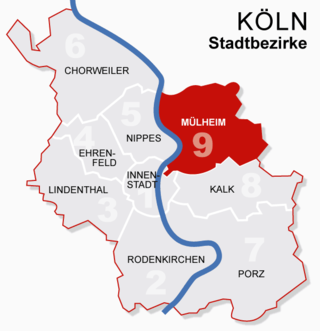
Mülheim is a borough (Stadtbezirk) of Cologne in Germany and a formerly independent town. Mülheim is located on the right bank of the Rhine opposite the old town of Cologne.

The Brockes Passion, or Der für die Sünde der Welt gemarterte und sterbende Jesus, is a German oratorio, libretto by Barthold Heinrich Brockes, first published in 1712 and seeing 30 or so more editions over the following 15 years.
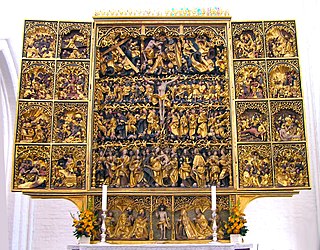
In Christian music, a Passion is a setting of the Passion of Christ. Liturgically, most Passions were intended to be performed as part of church services in the Holy Week.

The WDR Funkhausorchester is a German broadcast orchestra of the Westdeutscher Rundfunk in Cologne. The orchestra gives its concerts in such venues as the Kölner Philharmonie and in the Funkhaus Wallrafplatz.

Johann Heinrich Rolle was a German baroque composer.
Die Kölner Akademie - Damals und Heute is a German baroque and classical music orchestra founded in 1996 and based in Cologne, Germany. It was founded in 1996 by the American conductor Michael Alexander Willens, who studied at the Juilliard School in New York and still leads the orchestra.
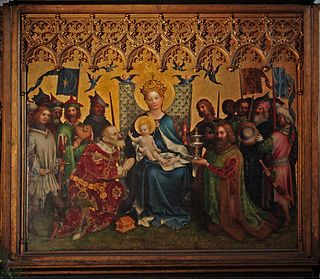
The term Cologne School of Painting was first applied in the 19th century to describe old German paintings generally. It subsequently came to refer more specifically to painters who had their workshops in medieval Cologne and the lower-Rhine region from about 1300 to 1550.

Lazarus or Die Feier der Auferstehung, D 689, is an unfinished 1820 oratorio by Franz Schubert on a libretto by August Hermann Niemeyer. Intended to be in three acts, only act 1 with twenty-one numbers, and eight numbers from act 2 are extant.

Charles-Auguste Sellier or, according to some sources, Charles-François Sellier was a French painter who specialized in mythological and historical subjects. Although not well-known during his lifetime, some of his works are considered to be precursors of Art Nouveau.

Die Zerstörung Jerusalems, , is an 1840 oratorio by Ferdinand Hiller to a libretto by Salomon Steinheim largely based on biblical texts from the Book of Jeremiah and the Psalms.
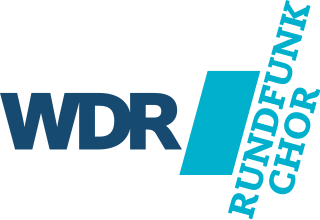
The WDR Rundfunkchor Köln is the choir of the German broadcaster Westdeutscher Rundfunk (WDR), based in Cologne. It was founded in 1947. The choir premiered works by contemporary composers including Arnold Schoenberg's unfinished opera Moses und Aron in 1954, Karlheinz Stockhausen's Momente, Luigi Nono's Il canto sospeso, Bernd Alois Zimmermann's Requiem für einen jungen Dichter and Penderecki's St Luke Passion.
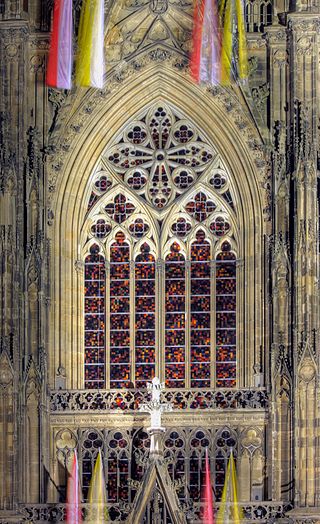
The Cologne Cathedral Window is the stained glass window in the south transept of the Cologne Cathedral designed by Cologne artist Gerhard Richter. On a surface of 106 square metres 11.263 glass squares in 72 colours of 9,6 cm × 9.6 cm were principally arranged randomly, with others selected in response to architectural context. The window was inaugurated on 25 August 2007 as part of a Eucharistic celebration; the abstract execution was both celebrated and strongly criticized.
Das Sühnopfer des neuen Bundes is an 1847 passion oratorio by Carl Loewe after a libretto by Wilhelm Telschow (1809—1872). The libretto contains poetic-dramatic paraphrasing of the biblical Passion stories.
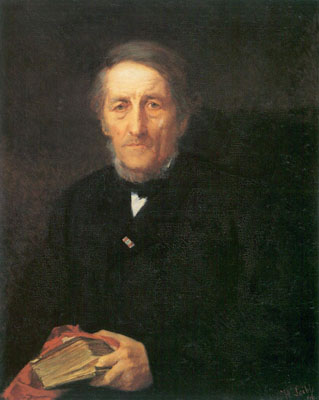
Carl (Karl) Leibl was a German musician, conductor, cathedral organist and cathedral conductor in Cologne.

The Kölner Domchor is the boys' choir at the Cologne Cathedral, officially founded in 1863. The choir rehearses three times per week. They perform regularly in services at the cathedral, and in concerts there and on international tours, including to Rome and the United States. The choir has been successful at choral competitions.
Jan Hus is an oratorio by Carl Loewe to a libretto by August Zeune. It premiered 16 December 1841 with the Berliner Singakademie. In choosing this subject Loewe and Zeune produced the first oratorio based on the theme of the Reformation, preceding Luther in Worms (1876) by Ludwig Meinardus.
Die Auferweckung des Lazarus may refer to
Die Auferweckung des Lazarus is a 1773 oratorio by J. C. F. Bach to a libretto by Johann Gottfried Herder.
References
- ↑ A History of the Oratorio: Vol. 4 Howard E. Smither · 2012 p 96 1913 Healing a man born blind Loewe Heilung 1860 Raising of Lazarus Schubert Lazarus 1820 (unfinished) Sobolewski Lazarus 1837 Späth Lazarus 1847 Vogt Lazarus 1858 Loewe Lazarus 1863 Boigt Lazarus 1880 a Loewe's is the only one of the ...